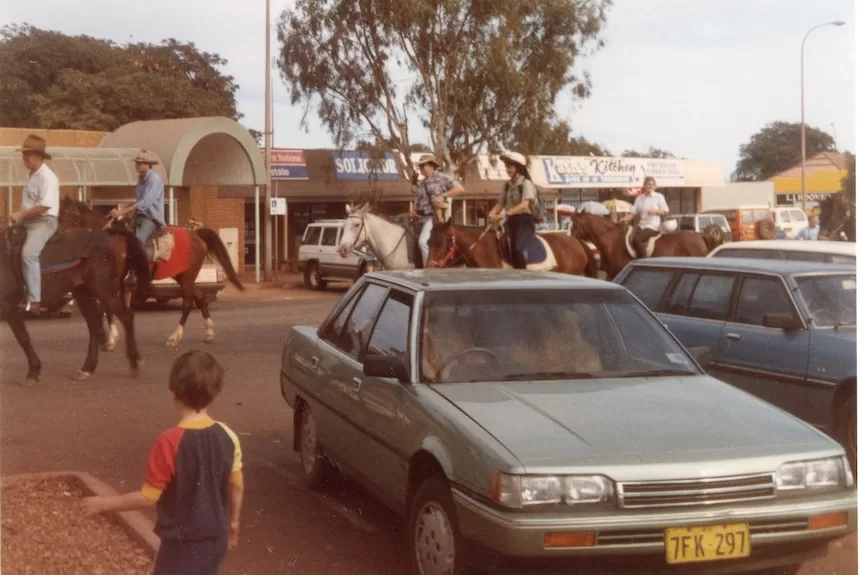The dusty streets are quiet in the West End of Port Hedland, houses are vacant, and gardens have shrivelled up in the heat.
But residents say this “ghost town” used to be a glamour spot in the mining and port town, 1,600 kilometres north of Perth in Western Australia’s Pilbara.
“The West End used to be like the Dalkeith of Hedland … for a number of years the West End was the address to live in,” real estate agent Morag Lowe said.
“There’d be no parking [spots available] because the place was buzzing and we were very excited about the future of the West End.
“We had cafes, we had shops … it was the happening place until it all stopped.”
Residents in the once thriving suburb say they’ve watched it decline since the introduction of a voluntary buyback scheme, which has given hundreds of home owners the chance to sell up and leave the dust-affected area.
The Port Hedland Voluntary Buyback Scheme was a response to the 2018 Port Hedland Dust Management Taskforce Report, and allows the WA government to buy residential properties in the shadow of one of the world’s largest bulk export ports.
About 400 home owners in the West End area are eligible to sell through the scheme, which is being paid for by industry.
So far more than 200 homes have been sold.
David Murphy and his wife were among those who took up the government’s offer.
While they said they got a fair price, the sale was still a sore point and the pair had since left town.
“We had no reason to leave at all,” he said.
“That was our home, it was our castle, we put a lot of blood, sweat and tears into that place.
“If the buyback wasn’t there and the iron ore producers controlled their dust and didn’t make it an issue we’d still be there.”
‘Ghost town’
The scheme was due to finish at the end of 2023, but the state government has extended it for another two years, in an attempt to get more people to sell up.
Those who own property in the port-side suburb say the sale of houses through the scheme has changed the feel of the area.
Michael Kemp and his dad bought an ocean-front apartment block as an investment.
“You can definitely tell the ones that have been sold to the buyback, the retics been turned off, and everything’s dead,” he said.
“You’re driving basically through a ghost town.”
Buyback offers were initially based on 2019 property prices together with indexation and a 35 per cent premium.
But with the extension of the scheme, the WA government will change how properties are valued, saying any future downturn in market value for properties will be reflected in the price offered.
Mr Kemp said the community had been pressured to sell.
“The fear that they’re putting into people would have a lot to do with a lot of people selling, like the uncertainty of where to go next,” he said.
“They all seem to think we’re after a lot of money for our houses but, at the end of the day, we just want our money back for what it cost us to put that there.
“If that’s millions of dollars then it’s millions of dollars, it’s a form of income.”
Reluctant residents
The land in the West End has been rezoned, meaning new homes can’t be built there.
But with housing in the Pilbara at a premium, the government says existing properties bought through the scheme will be used for short-term housing, port operations, and training centres for industry.
The West End will be redeveloped into an area for commercial, leisure, tourism, educational, and port activities.
Local MP Kevin Michel said Port Hedland was a vibrant town and the scheme would help create an exciting new precinct that would be transformational for the town and the greater Pilbara region.
But residents such as Doris Koehler-Teufel weren’t convinced about the changes.
“I think the best part of town will be destroyed,” she said.
“Port Hedland is turning 128 this year … all this history of the pioneering of this area will get lost.”
Ms Koehler-Teufel was adamant she would stay in the West End.
“I want to live there as long as possible because it’s my own,” she said.
“It’s just the right size for me as a low-income earner, and you can’t afford to rent anything in Port Hedland.”
Arnold Carter, 96, was also reluctant to sell the seaside home he built in 1962.
The trees he planted as saplings have since filled with birds and tower over his roof.
“It’s my crown,” he said.
“That would be the last thing on earth that we at our age would even consider — shifting from a house that you’ve lived in for 60-odd years.”
Find more local news
Browse for your location and find more local ABC News and information
